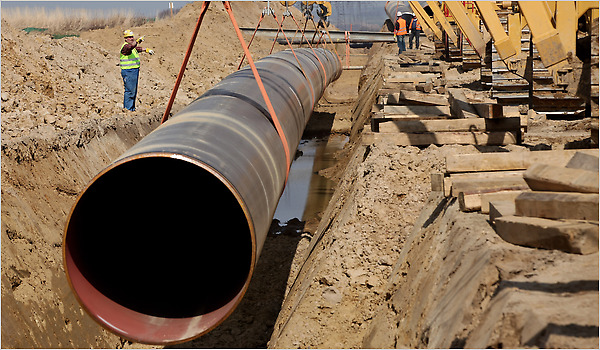
German Energy Sector Open For Russian Grabs After Merkel Medvedev Meeting (Part Two)
Publication: Eurasia Daily Monitor Volume: 8 Issue: 141
By:

President Dmitry Medvedev and Chancellor Angela Merkel led the Russian-German Interstate Consultations on July 19-20 in Hannover. This annual event, with the collective participation of Russian and German government ministers and industry leaders, punctuates the gradual integration in key economic sectors of the two countries.
Germany’s recent political decision to phase out nuclear energy delighted the Russian side at this summit. Medvedev’s delegation offered to supplement gas deliveries massively within the next decade and beyond, so as to replace the lost nuclear power at least in part with Russian gas in Germany’s energy mix.
In return for supplementing gas deliveries, Russia advances a familiar demand and a new one. The older goal is direct access by Gazprom to German end-consumers through jointly owned pipelines and storage on German territory. Russia is advancing toward this goal incrementally. The new goal is the entry of Gazprom and potentially other Russian companies into joint power-generating ventures within Germany, in return for long-term guaranteed supplies of Russian gas. Germany’s decision to phase out nuclear energy totally within a decade (starting immediately), with no plans yet on how to fill the gap, renders the country vulnerable to Russian advances on both of those tracks (see EDM, July 21).
In Hannover, Medvedev declared, “We must tackle the issue of effective gas deliveries to end consumers, and there are a number of organizational problems [involved]” (www.kremlin.ru, July 19). The Russian president (himself a former chairman of Gazprom) was alluding to expansion of Russo-German jointly owned pipelines and storage sites on German territory. Wingas, the distribution pipeline network owned by Wintershall and Gazprom as a parity joint venture in Germany, is the trail-blazing example. The same joint company operates Europe’s largest existing gas storage site (with a capacity of 4 billion cubic meters [bcm]) at Rehden in Germany’s north-west (whence Gazprom targets also the Dutch market).
At present, Russia seeks German political and legal/regulatory acceptance of three additional joint ventures of Gazprom in Germany: the Katharina gas storage site in the Land Sachsen-Anhalt (with Verbund Netz Gas; final investment decision approved in May of this year); and the NEL and OPAL pipelines (Gazprom’s joint ventures with E.ON Ruhrgas and Wintershall), dedicated exclusively to connecting the Gazprom-controlled Nord Stream pipeline with Germany’s interior. Russia and its business allies have lobbied in Berlin and Brussels for acceptance of these vertically integrated monopoly arrangements. From this point onward, Germany’s self-inflicted deficit of internally-generated energy will facilitate this process.
The Nord Stream pipeline’s first stage of construction is due to be completed in the fall of 2011, with first commercial gas to flow in spring 2012 from Russia to Germany on the Baltic seabed. The second stage is officially scheduled for completion in the fall of 2012 and commercial operation in spring 2013. Either stage is designed for a capacity of 27.5 billion cubic meters (bcm) annually, for an ultimate total of 55 bcm per year, and a service life of 25 years. Meanwhile, only the first stage of Nord Stream is backed by a dedicated source of gas – namely, the Yuzhno-Russkoye and Achimovskoye fields in western Siberia (Soviet-era discoveries).
The first-stage flow is contracted to Nord Stream’s minority shareholders (E.ON Ruhrgas and BASF/Wintershall with 15.5 percent each, Nederlands Gasunie and Gaz de France with 9 percent each) and some other customers for smaller volumes. Nord Stream’s second stage had been assumed to be supplied from the Shtokman gas field in the Russian Arctic. However, development of that field never started; development costs were deemed excessive by Western investors; and the development period would be too long for Shtokman to supply the Nord Stream pipeline’s second stage, if the latter is built on the declared schedule. All those plans were laid and dropped well before Germany’s repudiation of nuclear energy. Moscow wants them reconsidered in this new light (Interfax, July 17, 18).
In Hannover, the two governments made a first attempt to estimate the share of Russian gas in covering the energy deficit of a post-nuclear Germany. Publicly at least, the discussion sounded speculative and inconclusive.
The German government and opposition have all rushed to repudiate nuclear energy without any plans to fill the resulting gap in the energy mix. They only speak vaguely about resorting to natural gas and renewables, but seem unable to indicate volumes, costs, or timetables. Acknowledging that German demand for energy imports is now set to “grow by leaps and bounds,” Chancellor Merkel wanted Russian gas imports to increase “within reasonable levels,” “not out of control.” Unable to estimate the respective shares of gas and renewables in covering the deficit, she had to fall back on platitudes: “The market will decide” (Handelsblatt, Financial Times Deutschland, DPA, July 19-21).
The sides seemed to agree in broad terms that Gazprom could cover at least 30 percent to 35 percent of Germany’s additional demand (that resulting from de-commissioning nuclear power plants). Medvedev and First Deputy Prime Minister Viktor Zubkov declared that Russia could deliver the additional volumes “without problems,” using the Nord Stream One pipeline and the existing Yamal line (Interfax, RIA Novosti, July 19, 20).
Zubkov, who is concurrently the chairman of Gazprom (Medvedev’s former post), made one of the most meaningful remarks in the public discussion. He emphasized that Gazprom would not sign new contracts for the additional delivery volumes, but would add such volumes to the existing contracts, which run for decades ahead. These are take-or-pay, oil-price-pegged, long-term contracts. For Germany, all this would imply deepening and perpetuating its dependence on inordinately expensive Russian gas.




